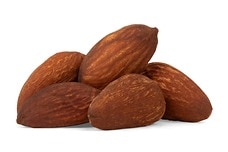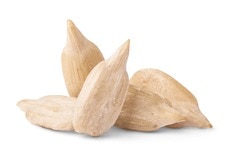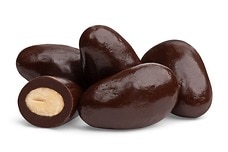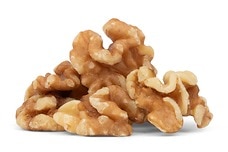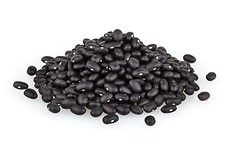5 Foods to Eat on an Anti-Inflammatory Diet
Many of our most costly diseases -- Alzheimer’s, heart disease, cancer -- have a common underlying problem: inflammation (DiCorleto, 2014). Inflammation is a natural physiological process and is actually a sign that your immune system is working properly. When your cells detect a pathogen, they send out signals to the immune system. The immune system responds by sending a wave of pro-inflammatory cells that release compounds that trigger an inflammatory response (Henochowicz, 2014). This is why you experience swelling, tenderness, and redness at the site of an injury.
Under normal circumstances, inflammation helps prevent us from getting sick. The body’s immune response fights off foreign invaders and keeps us healthy. Unfortunately, chronic inflammation can seriously undermine your health. If inflammatory cells remain active for too long, they can affect the properties of your arteries (DiCorleto, 2014). Similarly, prolonged inflammation in the brain may increase your risk for Alzheimer’s disease or other neurological problems (Akiyama et al., 2000).
So, how can you help regulate your body’s inflammatory response? Although more research is needed, there is some evidence that suggests the foods you eat contribute to the levels of chronic inflammation in the body (Doheny, 2008). Thus, by altering your diet to include plenty of anti-inflammatory foods, you may decrease your risk of chronic disease.
Foods to Limit on an Anti-Inflammatory Diet
Certain foods can increase the amount of chronic inflammation in the body. Unfortunately, the modern American diet is full of these potentially harmful foods. To follow an anti-inflammatory diet, limit your consumption of the following foods (Harvard Women’s Health Watch):
- Refined carbohydrates. Eating refined carbohydrates quickly triggers an inflammatory response in the body (Oliveira et al., 2013). In particular, refined carbs can lead to increased release of a class of inflammatory markers called cytokines. Thus, it is important to avoid white bread, pasta, pastries, sugar, and foods made with all-purpose flour. Instead, try to incorporate whole grains into the diet. Whole-wheat pasta, buckwheat, bulgur, quinoa, and farro contain complex carbohydrates that limit inflammation.
- Red meat or processed meats. Red meat contains compounds that trigger the body’s inflammatory response. In fact, the inflammatory properties of red meat are thought to be one of the mechanisms linking higher red meat consumption to greater risk of colorectal cancers (Samraj et al., 2015). Reducing your consumption of burgers, steak, and ground beef can lower levels of inflammation. Avoiding processed meats such as sausage, hot dogs, bacon, or corned beef also helps.
- Soda. Soda is full of sugar, which is considered a refined carbohydrate. Opting for diet soda may be a healthier choice, as it includes artificial sweeteners that may not have as large of an impact on inflammation. Also beware of fruit juices, flavored water, and other beverages that are high in sugar.
- Margarine, lard, and shortening. Trans fats are a type of unsaturated fat that can significantly increase your risk of cardiovascular disease. It is possible that the mechanism linking trans fat intake to cardiovascular risk is inflammation. For example, a large study of healthy women found that those who ate larger amounts of trans fats had significantly higher concentrations of markers of systemic inflammation (Mozaffarian et al,. 2004). Trans fats are naturally found in some animal products, such as butter, full-fat dairy products, and lard. They are also found in high amounts in processed foods such as cookies, cakes, crackers, margarine, and shortening. Instead, use olive oil, safflower oil, or other vegetable oils to saute vegetables or flavor your meals.
Inflammation-Fighting Foods to Enjoy
Fortunately, some of the foods you eat can actually fight against the effects of inflammation. Focus on getting plenty of the following foods into your diet to keep inflammatory markers in check:
- Spices. Spices like ginger, curry, and turmeric are all linked to fighting inflammation in the body.
- Tomatoes. Not only are tomatoes delicious, but they are also rich in nutrients that fight against inflammation. Tomatoes are high in the phytochemical lycopene, which is a type of carotenoid with antioxidant properties. They are also a good source of vitamin C. Together, these nutrients can increase antioxidant activity, reduce inflammation, and lower cholesterol (Jacoba, Periagoa, Bohma, & Ros Berruezoa, 2008). Either fresh or cooked tomatoes contain the nutrients that have anti-inflammatory effects. However, some evidence suggests that lycopene levels may be higher in cooked tomatoes than raw, giving you extra incentive to cook some fresh tomato sauce over whole-wheat pasta (Fielding, Rowley, Cooper, & O’Dea, 2005).
- Leafy green vegetables. Leafy greens are touted for their numerous health benefits. Among these is the potential to significantly reduce inflammation (Harvard Women’s Health Watch, 2015). To ensure you get enough, make healthy salads with a bed of spinach, kale, mustard greens, or leaf lettuce. Alternatively enjoy cooked collard greens, turnip greens, or Swiss chard as a side dish with any meal.
- Fatty fish. Fatty fish are an excellent source of omega-3 fatty acids, which are known to lower chronic inflammation (Erlich, 2015). In particular, fatty fish contain eicosapentaenoic acid (EPA) and docosahexaenoic acid (DHA), which have significant anti-inflammatory effects. Enjoy salmon, mackerel, sardines, anchovies, or trout to get the anti-inflammatory benefits of omega-3 fatty acids.
- Nuts. Healthy nuts are chock full of the polyunsaturated and monounsaturated fats but contain very little unhealthy saturated fat. As a result, nuts have major anti-inflammatory effects (Harvard Women’s Health Watch, 2015). In particular, almonds, hazelnuts, pecans, and peanuts are excellent sources of vitamin E (Traber, 2015). Vitamin E may protect the body from the effects of harmful free radicals and have been shown to reduce inflammation (Traber, 2015). Thus, nuts make an excellent snack food. They can also be added to salads, incorporated into vegetarian burgers, or enjoyed in the form of nut butters.
- Olive oil. The Mediterranean diet is particularly well known for lowering the risk of chronic disease. One of the most important components of this diet may be olive oil (Harvard Women’s Health Watch, 2015). Olive oil contains nutrients called polyphenols, which prevent the release of inflammatory compounds.
Recipes with Anti-Inflammatory Foods
The recipes below are inclusive of foods known for their antioxidant content and nutritive value. For additional foods and recipes that may help regulate your inflammatory response, be sure to check out our article on antioxidants.
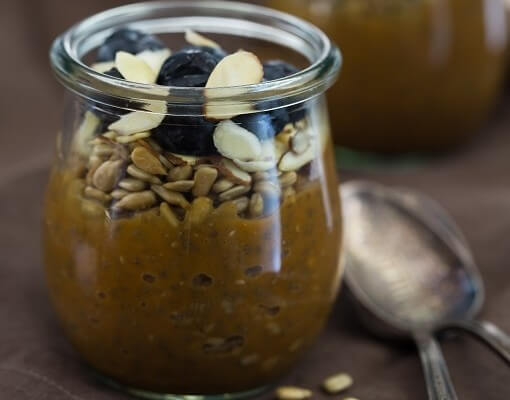
Pumpkin Chia Seed Pudding Recipe
This pudding recipe includes a blend of seeds, nuts and berries atop a pumpkin based treat is indelibly wholesome. The chia seeds included in the recipe also supply a source of omega-3 fatty acids, which also have antioxidant properties.
Ingredients: Milk, pumpkin puree, chia seeds, maple syrup, pumpkin spice, sunflower seeds, sliced almonds, fresh blueberries.
Total Time: 10 minutes
| Yield: 4 servings
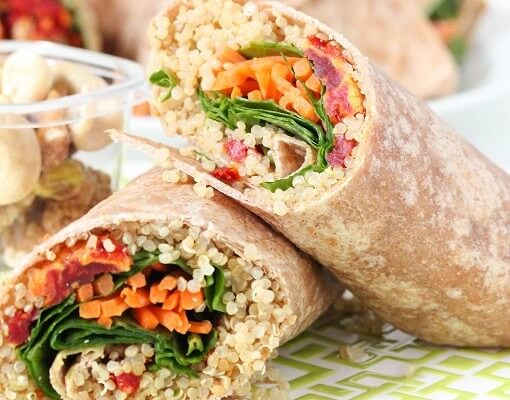
Quinoa Veggie Wrap Recipe {vegan}
This scrumptious wrap is made with sun-dried tomatoes that act as a source of the anti-inflammatory compound lycopene. The wraps also include spinach, which is contains an abundance of antioxidants and nutrients. Be sure to use whole grain wraps!
Ingredients: Tortilla wraps, quinoa, hummus, fresh spinach, sun-tomatoes, shredded carrots.
Total Time: 30 minutes
| Yield: 4 wraps
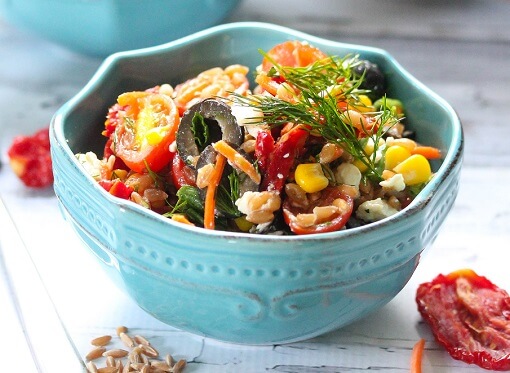
Farro Vegetable Salad Recipe
This superb salad contains two different types of tomatoes to double down on its sources of lycopene. The hearty pseudograin farro also acts as a great alternative to refined grains to add heft and protein to the dish, while the anti-inflammatory properties of vitamin C are offered by the 56% of the Daily Value (DV) for the nutrient in each serving.
Ingredients: Organic farro, sun dried tomatoes, frozen corn (thawed), scallions, black olives, feta cheese, cherry tomatoes, shredded carrots, salt, fresh dill, fresh mint, extra virgin olive oil, balsamic vinegar.
Total Time: 1 hour
| Yield: 6 servings
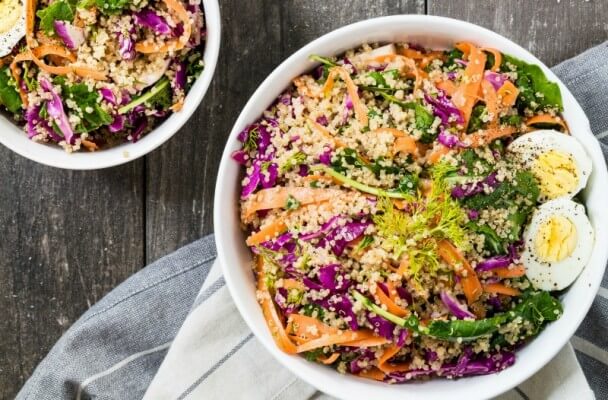
Kale Quinoa Salad Recipe
A combination of superfoods, the pseudocereal quinoa limits the introduction of inflammatory cytokines to your diet, while kale and extra virgin olive oil act as healthy means of combatting inflammation. The dish offers 76% of the DV for vitamin C in each bowl and is balanced to provide a healthy meal.
Ingredients: Quinoa, fresh baby kale, purple cabbage, carrots, fresh dill, boiled eggs, rice wine, extra virgin olive oil, black pepper.
Total Time: 25 minutes
| Yield: 8 servings
Anti-Inflammatory Snacks and Foods
The following snacks, ingredients, and foods contain antioxidants and may help keep inflammatory markers in check. Add these delights to your diet to contribute to your effort to regulate a healthy inflammatory response.
Healthy Eating
- Healthy Snacks
- Healthy Highlights
- 5 Uses for Cacao Powder
- 5 Ways to Eat Farro
- 6 Best Gluten-Free Foods
- Alcohol and the Body
- Almond Flour Recipes
- Anti-Aging Superfoods
- Beat the Afternoon Slump
- Benefits of a Plant-Based Diet
- Benefits of Baobab
- Benefits of Cashews
- Benefits of Coconut Oil for Hair
- Benefits of Coconuts
- Benefits of Dates
- Benefits of Fenugreek
- Benefits of Garcinia Cambogia
- Benefits of Goji Berries
- Benefits of Kale Chips
- Benefits of Monk Fruit Sweetener
- Benefits of Peanuts
- Benefits of Pecans
- Benefits of Pistachios
- Benefits of Pumpkin Seeds
- Benefits of Spelt Flour
- Benefits of Steel Cut Oats
- Benefits of Sunflower Seeds
- Benefits of Tiger Nuts
- Benefits of Turmeric
- Benefits of Walnuts
- Benefits of Wheatgrass
- Best Food Fads
- Cacao vs Cocoa
- Caffeine-Free Energy Foods
- Chocolate That's Good for You
- Diet vs. Exercise
- Fat Burning Foods
- Food Myths Debunked
- Foods for Bone Density
- Foods for Colon Health
- Foods for Healthy Hair
- Foods for Healthy Skin
- Foods to Help Sleep
- Foods to Reduce Stress
- Green Tea Benefits
- Healthy Baking Flours
- Heart Healthy Habits
- High Protein Health Risks
- How to Boost Your Metabolism
- How to Lose Weight While Aging
- How to Throw a Vegan BBQ
- Kaniwa vs Quinoa
- Little Health Foods
- Low-Carb: Fad or Friend?
- Making Healthier Desserts
- Mediterranean Diet Meal Plan
- Natural Beauty Products
- Nuts for Weight Loss
- Preparing Vegan Meals
- Preventing Muscle Degeneration
- Rare Superfoods
- Reduce Sugar Intake
- Save Time By Going Vegan
- Smarter Snack Swaps
- Smoothie Ingredients
- Soy Protein vs Whey Protein
- Starting a Plant-Based Diet
- Steel Cut vs Rolled Oats
- Sugar Substitutes
- Vegan Proteins
- Vegan Substitutions for Fall Recipes
- Why Go Vegan
- Healthy Meals
- Healthy Recipes
- Sports Nutrition
- Vitamins, Minerals & Nutrients

